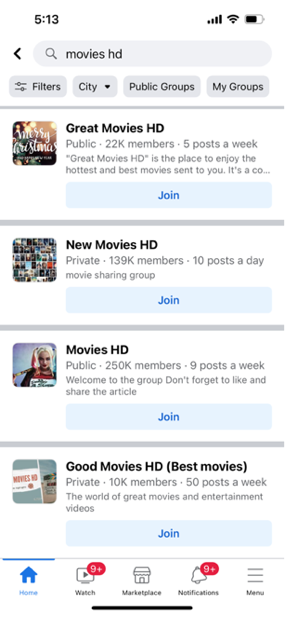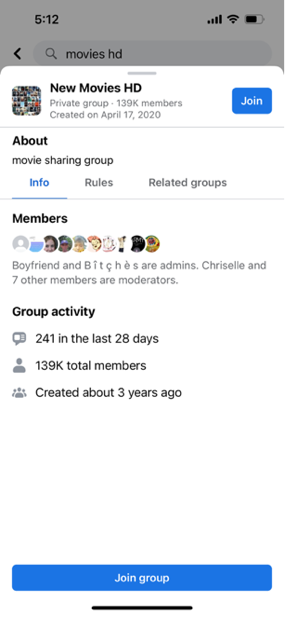Published Date: 05-24-23
In March 2022, we blogged about Rights Manager, Meta’s barely functioning content protection tool. As you may recall, Facebook introduced video to its platforms in 2007, after which, it waited NINE DAMN YEARS to release a product meant to stem the massive, entirely foreseeable tide of piracy that would come from introducing video.
It was a dick move – in true “move fast and break things” Silicon Valley fashion.
It has been a little over a year since our last update, so we took a fresh look. Meta proclaimed it was providing a new resource to help creatives use Rights Manager effectively in January 2023. Naturally, we wanted to see what progress the engineers at 1 Hacker Way had made.
Spoiler alert: not much.
Piracy Facebook Groups
To check up on Meta, we began by searching for Facebook groups devoted to piracy. We could no longer find Movies HD 4K, which had 70,000+ members by March 2022. Instead, we found larger piracy groups – without really even trying!
A public group, Movies HD, had 250,000 members. A private group, New Movies HD, which advertised itself as a hub for “movie sharing,” had 139,000 members. It was administered by a power couple, Boyfriend and B î t ç h è s.



Meta’s IP Transparency Metrics
Annoyed by the flagrant piracy groups, we visited Meta’s Transparency Center. Meta began reporting data on copyright infringement in 2017, but the semiannual reports have been difficult to take seriously.
According to its 2022 H1 report, the number of infringement complaints that Meta received per month continued an upward trend, reaching a record high of 259,000 in April 2022. By removing 68%-83% of reported content each month, Meta in effect conceded the complaints were largely legitimate.
We also scrutinized statistics on proactive enforcement, the removal of infringing content before rightsholders complain. Meta suggested that it routinely catches 69%-94% of infringement on its platforms, leaving little cause for rightsholders to worry.
The high percentages are convenient but misleading. Meta simply divided instances of infringement that it detected by the total amount of infringing content removed, with or without a rightsholder’s report. This method presumes that Meta or rightsholders flag every piece of infringing content. In reality, many copyright violations slip through the cracks.
Based on Meta’s publication record, we’re expecting its 2022 H2 transparency report in May. We’d prefer to read an independent audit, which could prove what everyone suspects: Meta’s IP protection efforts are abysmal.
Rights Manager
Finally, we examined a written summary of creatives’ frustrations with trying to protect their work using Rights Manager. The summary was compiled by a sister organization of CreativeFuture’s, which has been working with Meta for more than a year to get Meta to address creatives’ concerns.
Suspicious of Meta’s intentions, we have been clamoring the whole time to release the kraken, but our kinder ally counseled patience. Predictably, diplomacy with Meta has proved unproductive. Now, we’re raising hell about it.
To this day, few artists gain access to Rights Manager – even though Meta told Congress in December 2020 that its content protection tools are widely available to rightsholders, “subject to a simple application process.” 😂
When artists do manage to gain access, they find that Rights Manager lacks basic functionality. Here are some egregious examples.
When photographers or other visual artists search for copyrighted images, Rights Manager fails to identify matches if pirate uploaders have subjected the originals to simple, cosmetic transformations.
We’re not talking about GIFs that have been programmed to loop quadruple Axels. We’re talking about JPEGs that have been rotated left or right, mirrored, or wrapped onto coffee mugs for sale.
Most of these changes could be made by any muttonhead with a smartphone.
Strangely, when Rights Manager is used to search for infringing images that haven’t been altered, it returns an artificially restricted list of results. Notably, it omits matches that have already been on the platform for a while. (We don’t know what the cutoff is, but there seems to be one.) As a result, the oldest instances of infringement remain undiscovered unless artists stumble upon them or scour Meta’s platforms manually.
Similarly, Rights Manager blurs images and text from private groups, ostensibly to protect members’ privacy. As a result, artists can’t positively identify their images or evaluate whether they’ve been reproduced legitimately, perhaps under a license or in accordance with fair use.
Artists have reported, furthermore, that Rights Manager hides detected matches if creatives don’t act on them within an undisclosed window. After a certain point, it seems that Meta simply covers infringers’ tracks.
These flaws are fundamental and ridiculous – so much so that we wonder whether Meta has deliberately nerfed Rights Manager to favor infringers over rightsholders.
The Once Unthinkable Conclusion
We were already fuming after easily finding so many popular piracy Facebook groups and reading Meta’s latest IP Transparency Report. But the frustrating, incomprehensible problems with Rights Manager – and Meta’s repeated failures to address them – are just fucking unacceptable.
What is going on here? Why can’t Meta clean up its act on infringement? Why does it waste the time of creatives by asking them to test-drive tools that don’t work, and that Meta has no intention of fixing?
Meta has behaved so badly that we’re ready to say what once would have been unthinkable: Meta is even worse than YouTube!



